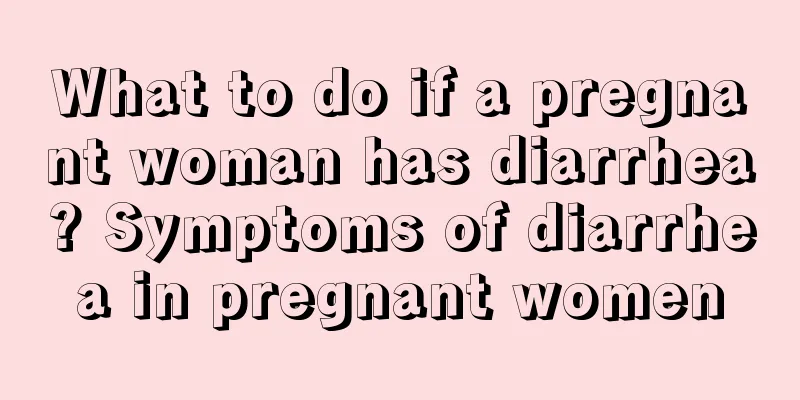What to do if a pregnant woman has diarrhea? Symptoms of diarrhea in pregnant women

|
Everyone must have had diarrhea. Diarrhea is a very common physical problem. Severe diarrhea can affect our health. Pregnant women tend to be nervous and worried when they have diarrhea. What to do if pregnant women have diarrheaTo relieve the symptoms of diarrhea in pregnant women, we must first find out the cause of diarrhea in pregnant women. Generally speaking, diarrhea in pregnant women is mainly caused by themselves. The hormones in pregnant mothers change, the time for gastric emptying is prolonged, and the peristalsis of the small intestine is weakened, so they are easily affected by external factors and have diarrhea. The internal causes of diarrhea include bacterial infection and changes in eating habits, or pregnancy combined with other chronic diseases, such as colitis. Some pregnant women have diarrhea in the early stages of pregnancy. In addition to the influence of eating habits, cold body and early pregnancy reactions, it may also be a sign of miscarriage and requires careful care. If it is diarrhea in the late pregnancy, in addition to gastrointestinal virus infection or food poisoning, it may also be intestinal obstruction. Diarrhea is also accompanied by nausea, vomiting, abdominal pain and bloating. If these symptoms occur, you need to seek medical attention in time. 1. Mild diarrhea Some pregnant women think they have diarrhea as long as their stool is a little loose and the frequency is a little high, and they become very nervous because they are worried about the adverse effects on the fetus. Experts emphasize that excessive mental stress is actually harmful to the fetus. Although diarrhea can cause abnormal peristalsis of the gastrointestinal tract, diarrhea twice a day generally does not affect the fetus. If it is mild diarrhea, pregnant women only need to go to the toilet like ordinary people to excrete toxins, so there will be no abdominal pain and diarrhea. 2. Recurrent diarrhea Frequent and severe diarrhea should be taken seriously, because repeated diarrhea leads to frequent gastrointestinal motility, which over time can cause uterine contractions, leading to miscarriage or premature birth. Therefore, if pregnant women have repeated diarrhea and the diarrhea lasts for more than 24 hours, they must see a doctor as soon as possible. Symptoms of diarrhea in pregnant womenGenerally speaking, pregnant women have a normal bowel movement once a day, and the stool is solid and lumpy, but pregnant women with diarrhea have a hard time. When pregnant women have diarrhea, they will have the following three characteristics, including frequent bowel movements, watery stools, and abdominal pain. Specifically: 1. Frequent visits, usually 4-5 times a day; 2. The stool becomes thinner, and the shape, color, and smell change. It contains pus, blood, mucus, undigested food, and fat, or turns into yellow water, green paste, and has a sour smell. 3. During diarrhea, there are symptoms such as abdominal pain, falling, tenesmus, and burning pain in the anus. Pregnant women have diarrheaMany pregnant women become very nervous when they have diarrhea. In fact, many diarrheas are caused by lifestyle factors and are functional diarrhea. Even emotional changes may cause diarrhea. If there are no signs of infection in the diarrhea, you can start with lifestyle adjustments and try to avoid injections and medication. 1. First of all, it is necessary to properly replenish fluids, replenish the water and electrolytes lost due to diarrhea, especially potassium ions, and replenish the calories lost due to diarrhea. At the same time, it is necessary to closely observe whether the fetus is in good condition and whether there are signs of premature birth or miscarriage. 2. Pay special attention to medication. Pregnant women should be especially careful when using antibiotics. In addition to adverse reactions, many commonly used antibiotics and anti-protozoal drugs have potential teratogenicity and should be banned. Some milder anti-diarrhea agents can absorb water and reduce intestinal motility, so you can try them. Do not use opium-based drugs to stop diarrhea, because these drugs may cause bacterial overgrowth and repeated infection, which will aggravate diarrhea. 3. Pregnant women with diarrhea who are about to give birth should be isolated at the bedside according to intestinal infectious diseases to ensure the safety of the baby and other mothers. 4. Pregnant women with diarrhea can generally resume normal bowel movements after 24-96 hours. If treatment is ineffective, fecal bacteriological culture and drug sensitivity test should be performed, as well as intestinal protozoa and parasite examination. Fibersigmoidoscopy should be performed carefully if necessary to exclude inflammatory bowel disease. 5. If a pregnant woman with diarrhea has an abnormal fetus, she should go to the hospital in time to prevent the disease from becoming serious and leading to miscarriage or premature birth. Precautions for pregnant women with diarrhea1. Diarrhea in pregnant women is mostly caused by infection Diarrhea in pregnant women is generally caused by infection. The most common pathogens are Salmonella, Shigella dysenteriae, Campylobacter and viruses. In addition, food poisoning or viral infections in other parts of the body may also cause diarrhea in pregnant women. The usual treatment for diarrhea in pregnant women is to give pregnant women appropriate fluids to replenish the water and electrolytes lost in the body due to diarrhea, especially potassium ions; replenish the calories lost due to diarrhea; at the same time, closely observe whether the fetus is in good condition, whether there are signs of premature birth or miscarriage, and follow the doctor's instructions for appropriate drug treatment. 2. Pregnant women with diarrhea should use drugs with caution Pregnant women should pay attention to diarrhea, because severe diarrhea may trigger uterine contractions and lead to miscarriage. And diarrhea will affect the absorption of nutrients by pregnant women. Therefore, once pregnant women have severe diarrhea, they should seek medical attention in time and take active measures for treatment. Some pregnant women's diarrhea is not severe, so they want to find medicine to take by themselves. If you really want to deal with it yourself, first of all, antibiotics should be used with caution. In addition to adverse reactions, many commonly used antibiotics and antiprotozoal drugs have potential teratogenicity, so it is best not to use them during pregnancy. Obstetricians and gynecologists emphasize that it is best for pregnant women with diarrhea to take medicine according to the doctor's orders. This is the safest practice. 3. Milk powder can also cause diarrhea Some pregnant women have neither food poisoning nor intestinal infection, but still have diarrhea, which may be related to drinking milk powder for pregnant women. Doctors say that it is not that there is something wrong with the milk powder, but that some people's stomachs are not adapted to milk powder, and they will have diarrhea after drinking it. If this is the case, just stop drinking milk powder and the problem will be solved. |
<<: How to prevent baby from getting cavities? Don’t let your child eat adults’ saliva
>>: Can electric blankets kill mites? Can electric blankets be folded at will?
Recommend
Children's interpersonal relationships start with learning to respect each other
Maintaining good interpersonal relationships is a...
How to eliminate the fear of prenatal pregnancy
The day of delivery is coming soon. Expectant mot...
How to wean? Scientific and reasonable weaning methods and precautions
Many babies need to prepare for weaning when they...
What does it mean when a pregnant woman dreams of eating dumplings? Will a pregnant woman dream of eating dumplings and give birth to a boy or a girl?
All kinds of dreams during pregnancy can easily m...
Is cesarean section safer than natural birth? What should you pay attention to after cesarean section?
Although natural birth is the most common way of ...
When is the best time to start early childhood education? How to conduct early childhood education efficiently?
When is the best time to start early education? I...
What does breast milk taste like? It tastes sweet.
Breast milk is the most suitable food for babies....
What are the white spots on my baby's gums?
What are the white spots on the baby's gums? ...
What should I do if I eat crabs during breastfeeding? What seafood can't I eat during breastfeeding?
Mothers have to avoid certain foods during pregna...
Can I get a tattoo on my caesarean section scar? How long after a caesarean section can I get a tattoo on my scar?
Many mothers who have had cesarean section births...
How to read the pregnancy test results? How to check whether you are pregnant with a pregnancy test?
To see if you are pregnant, you can buy a pregnan...
How to deal with children's rebellious period
It is normal for children to have a rebellious pe...
Is thin milk nutritious?
Many mothers will encounter the problem of thinni...
What actions are not suitable for pregnancy? These six actions will make the fetus very uncomfortable!
Pregnant women have many taboos during pregnancy,...
What are the benefits of breastfeeding after childbirth?
What are the benefits of breastfeeding after chil...









